- Home
- Edmund White
City Boy Page 16
City Boy Read online
Page 16
At Harry’s Bar the waiters were like characters in Goldoni’s The Servant of Two Masters, whirling chairs through the air and posing them beside an already crowded table or catching plates of pasta hurled out of the kitchen and rushing them upstairs (social hell) or to the backroom on the main floor (purgatory) or to the front room (heaven). There in heaven we’d see, sitting by the front door every time, a couple of elderly gay men from Kansas who came bedizened with their heavy gold necklaces (David called them “the chain gang”). They never spoke to anyone or to each other, but just sat there at the price of hundreds of dollars an hour absorbing old-fashioned gin martinis and looking on at each arrival and departure with all the attention they’d lavish on pigeons in San Marco. There we once saw Lady Diana Cooper, ancient but with startling sapphire eyes (David would have marked the word sapphire in my manuscript and then written in the margin, “The sin of aristocratic admiration,” which he considered a failure of taste as much as a breach in style). She and her husband, Duff Cooper, the British ambassador, had been the social leaders of postwar Paris. During the winter she lived alone in London in “Little Venice,” mostly bedridden, and there she would receive the Queen Mother for tea.
Those first two summers David lived on a rio between the Salute and the Guggenheim Museum across from the Da Cici pensione. Twice we saw Ezra Pound just before he died in 1972 with the violinist Olga Rudge walking slowly along. Pound no longer chose to speak, though he could. He was small and frail and carefully dressed and had a white beard and a cane. This is the man, I thought, who’d described his virulent anti-Semitism during the war years to Allen Ginsberg in the 1960s as “that suburban vice.” This was the man who’d invented Chinese poetry for our time and culture. Who’d been locked in a cage by the American army and been befriended by a black soldier and written about it in The Pisan Cantos. Who’d translated Egyptian poetry and troubadour poetry and parts of the Confucian Analects, launched vorticism in the plastic arts and imagism in poetry, drastically cut and rearranged The Waste Land for T. S. Eliot, written an opera (both words and music), written the ABC of Reading, and had made such an impression on me since my adolescence, and whose poetry struck me as faultless if daunting. Accompanying Richard Howard to Princeton once for a class he was teaching, I’d heard him say to his students that the two poets in English with the best “ear” were Herbert and Pound.
David, from the early 1970s up until 1985 (the year before his death), mounted a campaign to conquer Venetian society. As a goal for any other person, he would have laughed at that idea—since he was the first to recognize how vapid Venice could be. He often said, “Venice is as intellectually distinguished as Akron, Ohio.” But if it was small and closed, that made it all the more interesting to the novelist in David. For he had always wanted to write a novel and now began one that opened with a Harvard-educated professor at last getting a job back at his alma mater. He bends down and kisses the ground in Cambridge—or did he put lipstick on so that he could leave the imprint of a kiss on a window? I forget which, but the kiss seems a safe bet.
Though David lived in New York and worshipped the New York City Ballet, I think the city otherwise failed to stimulate his imagination. Manhattan was too big, too kicked-out—historical, yes, but all the evidence of its past worn down and built over and nearly erased. In Venice, by contrast, people bore historic names and lived in historic family palaces that in their way were in perfect repair. Behind the water gates of a palace could be seen the old wooden hood (the felze) of a gondola, an intricately carved fitting that protected the family from prying eyes or, in the winter, from icy winds. In the grand salotto were the ceilings by Tiepolo, and there, sitting around in gilded chairs in the dim light, were descendants of the very people pictured in the nineteenth-century watercolors in the hallway—ancestors at receptions in these rooms that were the same then as now. Here the pink marble floors were cracked and tilting, the plaster putti slightly grayed and missing a wing or a finger, but the same luminous and elevated luxury everywhere.
Most of David’s conquests were effected at the Cipriani pool. One would get into a boat just next to Harry’s Bar and a few moments later have been sped past San Giorgio and deposited at the hotel, then helped out by the uniformed arm of a young, golden-haired demigod. Led by one of the bagnini to a chaise longue by the pool, one would then enter the changing rooms and put on a swimsuit. This was the realm of wens and warts, of bellies and sagging tits—all outfitted in bathing costumes by Hermès or Valentino, and all cosseted on wonderfully upholstered deck lounge chairs with crisp white piping, and supplied with abundant white towels the size of bedsheets. At the shallow end was Patricia Curtis, standing in the water but resting her hands, heavy with family diamonds, on the poolside. Her family had been living in the Palazzo Barbaro for a hundred years, ever since an ancestor had quarreled with someone back home in Boston and in a rage moved his wife and children to Venice. Here they had played host to Henry James and John Singer Sargent and scores of other American visitors and expatriates. Now Patricia was watching her eccentric, fairly mad brother oversee the family’s loss of the palace; her son scarcely spoke English and handled the transfer of luggage from the Orient Express to the various five-star hotels in Venice.
Over there was John Hohnsbeen, a handsome guy from Oklahoma with cornflower-blue eyes and lips so full they looked as if they’d burst. He’d been a Martha Graham dancer and his body was still well-knit and powerful. He lived with Peggy Guggenheim and ran the museum here for her. John was an unabashed social climber and had had great success—at his fiftieth birthday party, which I attended, there were four “royals,” including the pretender to the Hapsburg throne.
John looked no more than thirty and said the secret of his youthful appearance was tuberculosis. At twenty he’d been tubercular and sent off to Switzerland for the “sleep cure,” in which the patient was put into an induced coma for long periods for a year. Apparently it not only cured TB, it ensured eternal youth. When, awakened like Sleeping Beauty, he’d returned to New York, his lover, the architect Philip Johnson, designed for him an all-white apartment. John had astonished his old fraternity brothers by striding about in a white silk peignoir with the only touch of color in the whole place being a drop of blood on his handkerchief. John was a born “capon,” a walker for rich and elderly straight women. I remember he used to visit a woman named Mrs. Walker in England who was a great-granddaughter of Johnnie Walker—that same Walker of whiskey fame with the top hat and cane, a Regency rake. John had never worked at any real job. He and Johnson had been lovers for a decade, and after Johnson moved on, he felt so guilty he paid John alimony for years. John had dabbled at being an art dealer at the Curt Valentin Gallery and elsewhere, but he didn’t have much to show for it beyond a good abstract wall sculpture by Hans Arp. I went to bed with John once but I’m afraid I wasn’t aggressive enough to interest him.
When Peggy died in 1979, she left him nothing but a Picasso drawing. Guggenheim curators from New York moved in and found snails crawling up the backs of paintings. John was suddenly out of a job, money, prospects. His wealthy ladies all seemed to have evaporated. He limped back to the States and lived quietly until an unglamorous uncle whom he’d scarcely known suddenly died and left John a small fortune. His Oklahoma family, which he’d always shirked in favor of his ladies, had come through. Finally John was able to summer in Venice again and winter in Key West (later Fort Lauderdale, when it became the gay capital for “silver daddies”). He rented a wonderful ground-floor apartment across from the Palazzo Albrizzi, though soon enough Venice became more and more difficult for him. By his seventies his emphysema had become so bad he could walk no more than ten paces without stopping and gasping—and Venice, a city without cars, requires lots of walking since gondolas cost hundreds of dollars a day to hire. In the end, in a suicidal but I thought rather heroic gesture, he decided to pay a call on a friend in Santa Fe where, everyone warned him, the altitude was so high that he’d never be a
ble to breathe. John, however, wasn’t about to have his social schedule interrupted by mere health. He went, was quickly hospitalized, and did indeed die in Santa Fe.
Besides John, another of David’s and my favorites in Venice was Maria Teresa Rubin, who headed the Save Venice Committee and who’d not long before divorced the composer Ernesto Albrizzi. His older brother Alessandro, the head of the family, who was also a New York decorator, gave us a tour of the Albrizzi palace, starting with the massive beacon in the front hall (some thirty feet high) that had once crowned the ship sailed by the last admiral of Venice, an Albrizzi ancestor. The palace had always belonged to the Albrizzis, and in the various salons were paintings of Albrizzi doges and other Albrizzi grandees. In the dining room were life-size stucco angels swooping down out of the ceiling like dive-bombers. Maria Teresa lived on the top floor and had a separate entrance and elevator. I suppose her ex-husband let her live there because she was raising their children.
Maria Teresa had a lovely, smoky gaze in which, from time to time, the smoke would clear to reveal the fire. She was slender with blond hair and high cheekbones. Someone must have once complimented her on her smoldering glance since she knew just how to work it, when to let it flare forth. She saw more “wickedness” in what the people around her said than they actually intended. Maybe that was her way of keeping herself interested in a fairly routine social life. She had a handsome young lover, Vladimir de Marsano, whose father was an Italian aristocrat living and working as a banker in Switzerland, and whose mother was a Serb. He’d grown up speaking Dutch to the nanny until one day his parents laid down the law and said, “We think it’s time you had a grown-up language of your own, and we suggest French,” and Vladimir was equally proficient in English and Italian. Vladimir was in his early twenties then and Maria Teresa in her forties, and they made a dashing, attractive couple. I suppose it helped that Vladimir, as a count in his impeccably tailored clothes, unlike a lot of young men his age didn’t resemble a willfully sloppy American college boy. He was affectionate, mysterious—we were all dying to know if he might not be a little gay around the edges, but he’d always meet our questions with a delighted laugh and an enigmatic smile. He had plenty of spirit that he usually held in check, and we knew not to press him too far. He, too, thought everyone was joking around him, which I think was less a form of paranoia than a disposition toward leggerezza. What I mean to suggest is that he was wonderfully serviable, polite and patient to a fault, always on the lookout for something fun and new and light, not too cultured himself but cultured just enough to maintain his membership in his upper-class world, affectionate and teasing with everyone, including much older and far less polished friends, capable of sweet friendliness—without ever showing his cards.
Another poolside habitué was Harry Mathews, the experimental novelist and the only American member of Oulipo, the French writers’ club that proposed mathematical models for works of fiction and poetry. He’d had an aristocratic mistress with the lovely first name of Loredana and was often in Venice. He and David were best friends (but who did not count David as his or her best friend?), and they had lots of worldly interests that I could not share—a new Venetian restaurant out by the Arsenale, new Missoni sweater designs, the new director of the Paris Opera, and Maria Teresa’s newest affair with someone they nicknamed Bambu, who would eventually become the most powerful arts bureaucrat in Italy. His real name was Vittorio Sgarbi and he was also, at some point, the Italian equivalent to the British layman’s art-history guru Sister Wendy, since he often discoursed on painting on television.
David had asked me to review one of Harry’s most difficult books, The Sinking of the Odradek Stadium, for the New York Times Book Review, which I’d done before ever meeting Harry (the Times editors didn’t want reviewers to know the authors they were critiquing).
I loved this hilarious, improbable novel and wrote a long essay about a later one, Cigarettes, also funny and utterly original. Harry was and certainly remains a great writer—one of the best I’ve ever known, though he’s never enjoyed the celebrity he deserves. He always had money, though he downplayed that, and later he inherited a large family fortune. Eventually he owned apartments in Paris (next to the prime minister’s hôtel particulier) and in New York (at first on Beekman Place) and houses on Long Island and in Vercors (near Annecy in the southeast of France) and two adjoining houses in Key West. Merrill seemed more relaxed about his money than Harry was with his. It did strike me that almost all the poets I knew were rich or had rich wives.
David had such terrible vision that he was capable of saluting a passing pigeon on the Giudecca, convinced it was a lady he’d once met. Nevertheless he loved to watch and assess all the little dramas playing out poolside at the Cipriani. On some days before he headed off for the afternoon we’d eat a diet lunch of prosciutto, salad, and a few slices of mozzarella. No bread, no wine, no dessert. Soon we’d be sick with laughter as we played bitchy alta borghese house-proud women, calling out, “Cara!” and typifying everything as carina (“cute”) and casalinga (“spotlessly domestic”), and archly complimenting each other on little flaws one would more likely feel embarrassed by: “O, cara, quanto i tuoi capelli sono bellissimi con questo nuovo colore.” Everything, even the dim matronly prospect of one day succumbing to the vanity of a dye job, sounded brighter and funnier and more tolerable to us couched in a prosperous housewife’s lightly carping, subtly “intimate” Italian.
What were we doing? I could imagine Simon Karlinsky turning away from our campiness with a fart-sniffing scowl of disapproval. Perhaps by impersonating two middle-class, middle-aged Italian women we were celebrating our tentative hold on the language, rehearsing roles that steered us away from the dangerous shoals of spurned love and put-upon chastity, and finally just indulging in the sublimely silly play unique to friendship.
For us Venice was such a complete contrast to New York. In New York, David could scarcely go out at night, too blind to negotiate the ill-lit, dangerous streets. Venice was safe, and a pedestrian city where every bridge step was lined with white stones. No Venetian was going to mug a tourist—how would he run away in a town without cars or motor scooters, where every boat was licensed and known and counted? With so many eyes behind every shutter, he’d be sure to be identified and denounced right away. If he was Venetian, his neighbors would know him. If he was a “foreigner,” that would register as well with the locals.
New York took its duties seriously and shrugged off its pleasures, whereas Venice was devoted to the delights of eating a sherbet, of visiting the tailor, of looking at the latest nouveautés (not all of them hideous) from the glassworks on Murano, of buying fish and vegetables under the Rialto Bridge, of dropping into the pasta shop and purchasing coal-black linguine flavored with squid ink, of watching the flush-faced, black-bearded butcher cut tidy little veal chops in his minuscule shop, of stopping at the drogheria and knowing the words for mustard (senape) and anchovies (acciughe). Even for its part-time residents, Venice represented the pleasure of knowing how to slip through the throngs of tourists (the sheep or pecore, as David called them) following their guide holding aloft a red umbrella and turn into a quiet calle before stepping onto the traghetto, the gondola that ferried people across the Grand Canal. David, usually so fearful and unphysical, knew just how to step onto the boat without slipping, stand all the way across without staggering, leave a few coins for Charon on the gunwale without under- or overtipping.
I can picture David with his face tanned and his hair silvered by the sun, wearing his azure-blue silk shirt and hand-sewn beige silk-and-wool trousers and black gondolier slippers and gold seal ring emblazoned with the Venetian lion. Neither of us was good at sustained conversation in Italian, though both of us could chat with waiters and shopkeepers. I’d stay behind at his apartment in the afternoons writing while he was off at the pool; around six he’d come back with the latest and a fresh bottle of Campari and a lemon. David had always taken a demanding book with him
—a new study of Spenser, say, or Ashbery’s Three Poems—though he seldom read more than a page or two. He was too busy being debriefed by George Smith, an American industrialist who ran a Goodyear factory in Bergamo and lived in a villa surrounded by German shepherd attack dogs and barbed-wire fences as protection against kidnapping for ransom, which was common in Italy in those days. George, with his cigarette holder, hairy barrel chest, and the handsome face of a society band conductor, was gay but celibate. He had converted to Catholicism and hoped to be made a papal baron; celibacy was not too high a price to pay for such an honor—or for his eternal salvation. His snobbism and his social-climbing form of Catholicism reminded me of Somerset Maugham’s Elliott Templeton in The Razor’s Edge, though George was humbler, less of a termagant than Elliott. His emotions he poured into his relationship with his adopted son, an upright young man of Bergamo whom George was about to marry off to a local heiress. I hitched a ride with George once as he was sped from Mestre to Bergamo in a Mercedes limousine driven by his uniformed chauffeur. I stayed over one day at the barricaded house, illuminated all night by spotlights and patrolled by the attack dogs. I remembered Hervé Guibert’s description of the fading Italian movie star living in a villa protected by German shepherds that obeyed commands only in German (“Auf! Sitz!”), and who kept all her old movies in a refrigerator, extracting one every evening on a rotating basis and watching it as the dogs prowled outside. I visited George’s plant, where I had a delicious three-course lunch in the company cafeteria. In Bergamo, at least, the employees spoke softly, wore clean uniforms, and seemed more like skilled watchmakers than assembly-line workers.

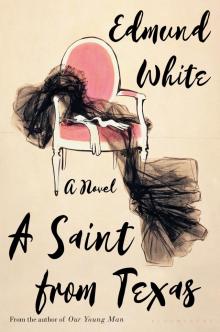 A Saint from Texas
A Saint from Texas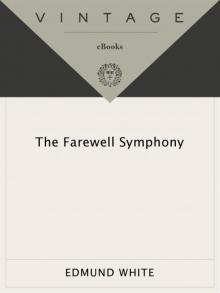 The Farewell Symphony
The Farewell Symphony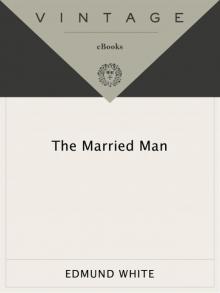 The Married Man
The Married Man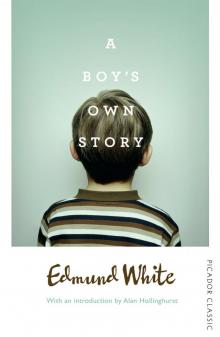 A Boy's Own Story
A Boy's Own Story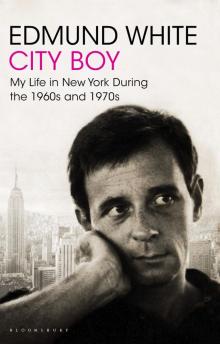 City Boy
City Boy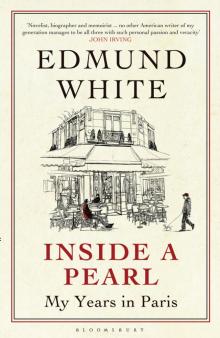 Inside a Pearl
Inside a Pearl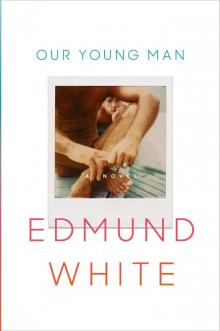 Our Young Man
Our Young Man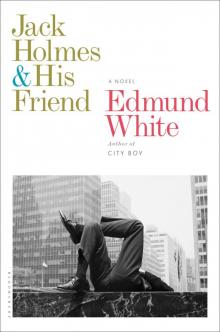 Jack Holmes and His Friend
Jack Holmes and His Friend